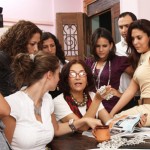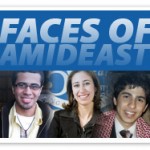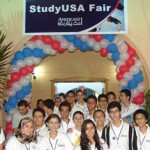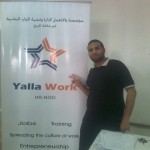This is the second blog in a series called EGYPT’S CRUSADE FOR MODERNIZATON. The modern young Egyptians are all pursuing educational skills to be prepared for the modern and global world in which we live. Today’s topic will discuss an organization located not only in Egypt but also in other parts of the Mideast. This is just one of the many wonderful groups whose aim is to improve the professional lives of the citizens in this part of the world. 
For over fifty years an organization called AMIDEAST has been in op eration in Egypt. It has offices in Alexandria and Cairo with smaller branch offices in Dokki and Heliopolis. AMIDEAST provides programs and services to Egyptian citizens who are interested in exploring United States study opportunities and in enhancing their communications and managerial skills for professional and personal advancement.
AMIDEAST provides experiences for academic and cultural exchange, English language training, test preparation, opportunities to study in the U. S., and professional training and development. For over forty years, this organization has helped students and professionals benefit from the many scholarships and exchange programs between the USA and the Middle East. Students can find out the necessary information on these educational opportunities by visiting the EducationUSA center. Numerous courses at different levels eithenr for business or pleasure are offered at their centers as well as programs to improve the skills required for the successful completion of standardized tests for academic and English language proficiency. As a representative for the Educational Testing Service (ETS), Prometric, and other testing organizations, AMIDEAST administers more than 21,000 language, aptitude, achievement, and professional qualifying exams each year in the Middle East. Finally, AMIDEAST provides professional development solutions and business opportunities for students, executives, and entrepreneurs by teaching them skills needed to succeed in the global market.  AMIDEAST has offered new programs to various groups in a variety of interest and academic areas. Here are some of the latest programs.
AMIDEAST has offered new programs to various groups in a variety of interest and academic areas. Here are some of the latest programs.
A new program in the summer of 2011 was created to expand opportunities for disadvantaged women. The Women’s Individual and Social Empowerment (WISE) Program has been helping 75 young women from some impoverished neighborhoods a chance to improve and break out of the cycle of poverty. Implemented with funding from the U.S. Department of State, the program emphasizes English language, life skills, and leadership training and awareness-raising through activities focused on topics such as personal safety, community engagement, and economic empowerment. It also teaches strategies for navigating the many challenges that lie ahead for these young women due to their gender and socioeconomic circumstances. Competition to get into the program was intense. Many applicants were attracted by the opportunity to develop the strong English language skills that would improve their academic and career prospects, yet are typically difficult to achieve in Egypt’s public schools. Indeed, although most had studied English for years, the vast majority could not answer simple questions in English. The WISE Program has been a big success so far. Today, these young women are confident users of English. Just as important, they now feel empowered. They know that they can help shape the future. 
A unique Fulbright initiative, developed in partnership with Islam’s oldest university, is building bridges of interfaith understanding, while giving concrete expression to President Obama’s call in Cairo in 2009 for broader engagement between the United States and the Muslim world. The Islamic Studies Program with Al-Azhar University is the result of collaboration between the Binational Fulbright Commission in Egypt and the administration of Al Azhar University, one of the leading Islamic institutions of higher education in the world. This program creates opportunities for a handful of students who specialized in Islamic studies at Al-Azha r to travel to and study in the United States each year, familiarizing themselves with American culture, religious practices, and education. Students in the program enroll in U.S. master’s or doctoral programs or pursue research in areas such as comparative religion, Islam in the United States, and Islamic jurisprudence. Equally important are the ample opportunities built into their programs to experience American society and culture with a particular focus on the diversity in religious practice in America. The first three ISP students began their studies in fall 2009. This program is beneficial for a better understanding for international relations as well. 
College fairs are a regular feature on AMIDEAST/Egypt’s fall calendar, but it was especially important to hold them the year in the aftermath of the Arab Spring and the January 25th Revolution. The fairs underscore the importance of continuing to provide the many educational and training opportunities. The fairs underscore the importance of continuing to provide the many educational and training services that Egyptians seek as they consider the next steps in their academic careers. Each fair features a booth for each participating university, as well as booths for EducationUSA and the U.S. Embassy. In an open discussion forum that is arranged in conjunction with the Cairo fair, panelists from different organizations respond to audience questions about the application process, student visa requirements, standardized tests required for U.S. university admissions, and aspects of U.S. higher education. A similar session is held in Alexandria for the Competitive College Club members and other selected students. Enrollments of Egyptian students at U.S. institutions have been steadily increasing in recent years. They reached 2,271 in the 2009/10 academic year, up from 983 five years earlier, according to the Open Doors data collected by the Institute of International Education. (No current statistics could be found.) The English Access Microscholarship Program (Access Program) is an exciting initiative of the U.S. Department of State. This highly effective training program is designed to provide a significant English-language learning experience to bright non-elite 14- to 18- year-old students. Funded by the U.S. Department of State’s Bureau of Educational and Cultural Affairs, it also has the goal of improving students’ appreciation of U.S. culture and values, encouraging critical thinking and open-mindedness, and improving performance in regular school classes. Launched in 2004, the Access Program is worldwide. AMIDEAST is currently serving over 6,000 youth in nine MENA countries: Egypt, Jordan, Kuwait, Lebanon, Morocco, Oman, Tunisia, the West Bank/Gaza, and Yemen. It has several main goals. First, the program enables bright non-elite students from underserved communities to gain English language proficiency and other communication skills. Secondly, it promotes better understanding of the USA culture and society. Third, it encourages appreciation of civic values through community service activities. Fourth and finally, it helps students better prepare for educational and career opportunities that enable them to contribute to their societies’ development. AMIDEAST English Access Microscholarship Program has benefited over 13,000 bright, economically disadvantaged 14-to-18-year-olds in AMIDEAST’s countries since the program’s inception in 2004. It has opened doors to many educational and career opportunities for many young people. Some students were even able to study abroad in such U.S. programs as the Youth Exchange and Study (YES) Program.
The English Access Microscholarship Program (Access Program) is an exciting initiative of the U.S. Department of State. This highly effective training program is designed to provide a significant English-language learning experience to bright non-elite 14- to 18- year-old students. Funded by the U.S. Department of State’s Bureau of Educational and Cultural Affairs, it also has the goal of improving students’ appreciation of U.S. culture and values, encouraging critical thinking and open-mindedness, and improving performance in regular school classes. Launched in 2004, the Access Program is worldwide. AMIDEAST is currently serving over 6,000 youth in nine MENA countries: Egypt, Jordan, Kuwait, Lebanon, Morocco, Oman, Tunisia, the West Bank/Gaza, and Yemen. It has several main goals. First, the program enables bright non-elite students from underserved communities to gain English language proficiency and other communication skills. Secondly, it promotes better understanding of the USA culture and society. Third, it encourages appreciation of civic values through community service activities. Fourth and finally, it helps students better prepare for educational and career opportunities that enable them to contribute to their societies’ development. AMIDEAST English Access Microscholarship Program has benefited over 13,000 bright, economically disadvantaged 14-to-18-year-olds in AMIDEAST’s countries since the program’s inception in 2004. It has opened doors to many educational and career opportunities for many young people. Some students were even able to study abroad in such U.S. programs as the Youth Exchange and Study (YES) Program.
 These are just four of the many programs being developed and utilized to facilitate better learning and career opportunities for young Egyptians. The work of this prestigious organization continues to grow more and more each year.
These are just four of the many programs being developed and utilized to facilitate better learning and career opportunities for young Egyptians. The work of this prestigious organization continues to grow more and more each year.
This organization was recommended to me by my dear and very close friend Ahmed Shewail. Ahmed is a recent graduate from Zagizig University at Sharikya, Egypt, in the Department of English Accounting. Ahmed is very active in many volunteer programs and is always seeking to improve his English skills and his career opportunities. He is highly intelligent, always positive, and highly motivated. Ahmed participated in two courses at AMIDEAST. The first one was an intermediate level course in listening and speaking English from August to October in 2011. The second course was an advanced level course from February to March 2012. Ahmed considers both courses to have been highly beneficial to improving his English skills. He also indicated that the instructors were excellent and very professional in their teaching skills. He is currently searching and interviewing for the perfect job opportunity. He desires to be successful, marry and have a family, and travel internationally in the future. Ahmed is one of those rare young men who is an asset to his community, his country, and to all who know and love him. He is one of the kindest and honest young men I have ever known and is always willing and ready to help anyone in need. 
Randi D. Ward
September 20, 2013





